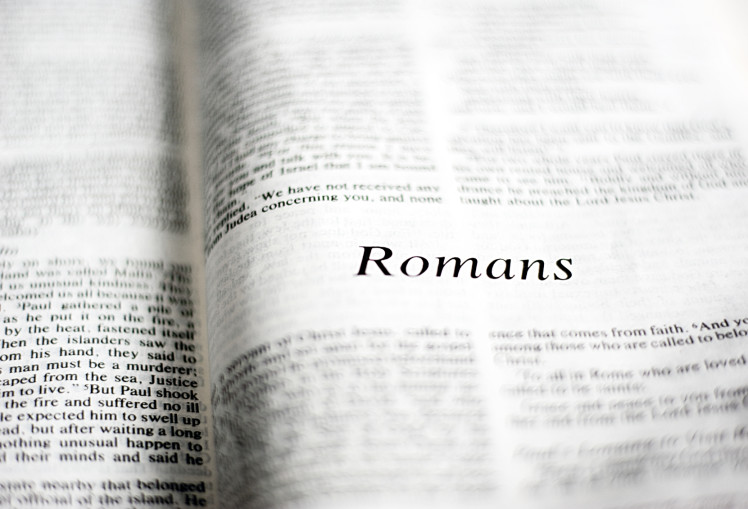Blog

Romans Bible Guide – Day Three
February 17, 2016
Previously, in Romans: Paul ends his introduction by saying Jesus, not the Roman Emperor, is the just and dependable King of the world, with the good news that all people who trust him will be rescued into right-living lives, in an inclusive community of all people of faith.
Romans 1:18-25
18 For the wrath of God is revealed from heaven against all ungodliness and wickedness of those who by their wickedness suppress the truth. 19 For what can be known about God is plain to them, because God has shown it to them. 20 Ever since the creation of the world his eternal power and divine nature, invisible though they are, have been understood and seen through the things he has made. So they are without excuse; 21 for though they knew God, they did not honor him as God or give thanks to him, but they became futile in their thinking, and their senseless minds were darkened. 22 Claiming to be wise, they became fools; 23 and they exchanged the glory of the immortal God for images resembling a mortal human being or birds or four-footed animals or reptiles.
24 Therefore God gave them up in the lusts of their hearts to impurity, to the degrading of their bodies among themselves, 25 because they exchanged the truth about God for a lie and worshiped and served the creature rather than the Creator, who is blessed forever! Amen.

Points of Interest:
- ‘For the wrath of God…’ – Here’s one of those moments where Paul turns difficult. Just when we were talking about a God who rescues all people, he takes us into a discourse about all the reasons we need rescuing, and – with language like wrath, ungodliness, and wickedness – we see it’s not going to be gentle. Let’s dig in and see what we find.
- ‘those who by their wickedness suppress the truth’ – What’s the heart of the problem here? People seem to have lost God and gone sour, and it shows in our tendency to suppress the truth. What, according to Paul, is the truth we keep suppressing? That there is an invisible, but good and powerful God who made everything and cares for it. Paul thinks this is an obvious truth that people routinely resist – perhaps because we’d rather try to be big people with small gods than be small people with a big God.
- ‘his eternal power and divine nature … have been understood’ – On the one hand, this is the broadest possible view on God in the world. All people, at all times, can see that God is powerful and good. On the other hand, Paul has a pessimistic view of human nature and human society. We consistently lose sight of what’s truest and most important in the Universe, we are prone to foolishness even when we think we’re being clever, and we’re really good at inventing fairly ridiculous objects of devotion. Taking the long view on human history, I find it’s hard to argue with any of this.
- ‘God gave them up’ – Paul says the result of all this is “the wrath of God” and God “giving us up” to how we want to live, however poorly that might go. This language has been tied to some unfortunate images over the years. We are not talking about the anger of a toddler (or me at my worst), getting ticked off that he’s not getting attention and kicking us out into the cold. After all, Paul says this is a God we’ll want to honor and he himself breaks out into spontaneous worship at the end of this passage.More thoughtful people have given us two other ways we can understand this phrase, “the wrath of God.” Either God has a considered, steady anger toward human evil, injustice, and folly, and so rightly ensures we face negative consequences when we lose our way. Or the wrath of God is a metaphor for how God, in his wisdom and love, established the Universe, so that when we move away from a humble, trusting relationship with God, we experience God’s absence and face the natural results of the godless existence we have made for ourselves. Both of these understandings make sense to me. Regardless, Paul views this wrath of God as a problem needing to be solved, not a situation that is desirable for either God or people.
- ‘they exchanged the glory of God for images’ – It’s often assumed that this whole section is speaking about non-Jews, or non-Christian Gentiles, highlighting their foolishness while also revealing the judgmentalism of religious insiders. After all (spoiler alert here), Paul’s going to hit that beat hard soon. When Paul talks about people “worshiping and serving” the creature rather than the Creator, he’s using the exact phrase people used for respect for Greek and Roman gods and sacred objects, as well as the relatively new worship of the emperor. But his language also calls to mind important episodes from Jewish history, like the time when recently freed Hebrew slaves construct a golden calf to worship, even as they are encountering God more deeply than they had before. This tendency to prefer predictable, safe, controllable religion over a mysterious, beautiful, unpredictable God seems fairly universal.
Taking It Home:
For you – What do you think is most obviously true about God? What does it mean to stay responsive to this? How can you give God honor and thanks today, if that is part of your purpose as a human?
For your 6 – Many of us, Paul says, have a small view of God, that’s informed more by human images of God than the real deal. Pray that your 6 would be free from any of these broken images of God and rediscover God’s power and true nature.

